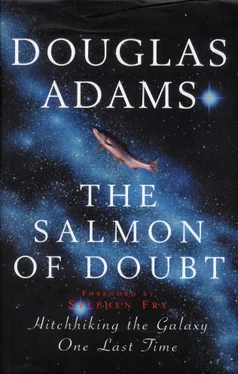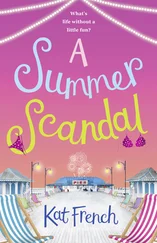Now, they had one very very particular effect on my life. It was a song they did, which I expect some of you here will know, called “Grand Hotel.” Whenever I’m writing, I tend to have music on in the background, and on this particular occasions I had “Grand Hotel” on the record player. This song always used to interest me because while Keith Reid’s lyrics were all about this sort of beautiful hotel—the silver, the chandeliers, all those kinds of things—but then suddenly in the middle of the song there was this huge orchestral climax that came out of nowhere and didn’t seem to be about anything. I kept wondering what was this huge thing happening in the background? And I eventually thought, “It sounds as if there ought to be some sort of floor show going on. Something huge and extraordinary, like, well, like the end of the universe.” And so that was where the idea for The Restaurant at the End of the Universe came from—from “Grand Hotel.”
Anyway, enough from me. We’re in for a great night tonight. There’s no band quite like them. And tonight I’m glad to say the London Symphony Orchestra is going to sit in with them. So I’d like for you to welcome please—the London Symphony Orchestra; the Chameleon Arts Chorus; Procol Harum; the conductor, the great Nicholas Dodd; and Gentleman-Scholar-Musician, and I believe now also Rear Admiral—Gary Brooker. Thank you very much.
From the Procol Harum and London Symphony Orchestra concert, FEBRUARY 9, 1996
Hangover Cures In fact—if I may digress for a moment (and if you don’t want me to digress, then you may find that you are reading the wrong column)—it turns out that there may be a very good reason why we fail to keep our New Year’s Resolutions other than the obvious abject feebleness of will. It’s this. We can’t remember what they are. Simple. And if we actually wrote them down, then we probably can’t remember where we put the piece of paper, either. Oddly enough, the piece of paper has sometimes been known to turn up again exactly a year later when you’re casting around for something on which to write the next year’s abortive attempts to pull your life into some kind of shape. This is not, it turns out, a coincidence. Incidentally, am I alone in finding the expression “it turns out” to be incredibly useful? It allows you to make swift, succinct, and authoritative connections between otherwise randomly unconnected statements without the trouble of explaining what your source or authority actually is. It’s great. It’s hugely better than its predecessors “I read somewhere that ...” or the craven “they say that .
. .” because it suggests not only that whatever flimsy bit of urban mythology you are passing on is actually based on brand new, ground breaking research, but that it is research in which you yourself were intimately involved. But again, with no actual authority anywhere in sight. Anyway, where was I?
It seems that the brain is affected by alcohol. Well, we know that, of course, and those who don’t yet are about to find out. But there are different gradations to the effect, and herein lies the crux. The brain organises its memories like a kind of hologram (it turns out). To retrieve an image, you have to re-create the exact conditions in which it was captured. In the case of a hologram, it’s the lighting, in the case of the brain it is, or can be (it turns out), the amount of alcohol sloshing around in it. Things that happen to you or, frighteningly enough, that you yourself say or do while under the influence of alcohol will only be recalled to your memory when you are under the influence of that exact same quantity of alcohol again.
These memories are completely beyond the reach of your normal, sober mind. Which is why, after some ill-advised evening out, you will be the only person who is completely unaware of some barkingly stupid remark you made to someone whose feelings you care about deeply, or even just a bit. It is only weeks, months, or, in the case of New Year’s Eve, exactly a year later that the occasion suddenly returns to your consciousness with a sickening whump and you realise why people have been avoiding you or meeting your eyes with a glassy stare for so long. This can often result in your saying “Jesus God” to yourself in a loud voice and reaching for a stiff drink, which leads you up to the next point of inebriation, where of course fresh shocks await your pleasure.
And the same is true on the way back down. There are certain memories that will only be retriggered by revisiting exactly the same state of dehydration as the one in which the original events occurred. Hence the New Year’s Resolution problem, which is that you never actually remember the resolutions you made, or even where you wrote them down, until the exact same moment the following year, when you are horribly reminded of your complete failure to stick by them for more than about seven minutes.
So what is the answer to this terrible, self-perpetuating problem? Well, obviously, rigorous self-discipline. A monastic adherence to a regime of steamed vegetables, plain water, long walks, regular workouts, early nights, early mornings, and probably some kind of fragrant oils or something. But seriously, the thing we are most going to want on New Year’s Day, and be desperately trying to remember how to make, is a good hangover cure, and especially one that doesn’t involve diving through the ice on the Serpentine. The trouble is, we can never remember them when we want them, or even know where to find them. And the reason we can never remember them when we want them is that we heard about them when we didn’t actually need them, which isn’t any help, for the reasons outlined above. Nauseating images involving egg-yolks and Tabasco sauce swill through your brain, but you are not really in any fit state to organise your thoughts. Which is why we need, urgently, to organise them now while there is still time. So this is an appeal for good, effective methods of freshening up the brain on New Year’s Day that don’t involve actual cranial surgery. Hangover cures, please, therefore, to know where to find them. And the reason we can never remember them when we want them is that we heard about them when we didn’t actually need them, which isn’t any help, for the reasons outlined above. Nauseating images involving egg-yolks and Tabasco sauce swill through your brain, but you are not really in any fit state to organise your thoughts. Which is why we need, urgently, to organise them now while there is still time. So this is an appeal for good, effective methods of freshening up the brain on New Year’s Day that don’t involve actual cranial surgery. Hangover cures, please, therefore, to
. And may the next thousand years be especially good ones for you and your descendants.
The Independent on Sunday, DECEMBER 1999
My Favourite Tipples I love whisky in every way. I love the way it looks in the bottle, that rich golden colour. I love the labels arranged on the shelf—the kilts and claymores and slightly out-of-focus sheep. I love the sense that it’s a drink that—unlike, for instance, vodka from Warrington—is rich in the culture and history of the place where it is distilled. I love particularly the smoky, peaty aromas of the single malts. In fact the only thing I don’t like about whisky is that if I take the merest sip of the stuff it sends a sharp pain from the back of my left eyeball down to the tip of my right elbow, and I begin to walk in a very special way, bumping into people and snarling at the furniture. I have therefore learnt to turn my attention to other tipples.
Margaritas I’m very fond of, but they make me buy very stupid things. Whenever I’ve had a few margaritas I always wake up in the morning with a sense of dread as to what I will find downstairs. The worst was a six-foot-long pencil and a two-foot-wide India eraser that I had shipped over from New York as a result of one injudicious binge. The confusing thing was that they arrived home several weeks after I did, so I found them downstairs one morning after having had just one glass of Chianti with my evening pizza.
Читать дальше










